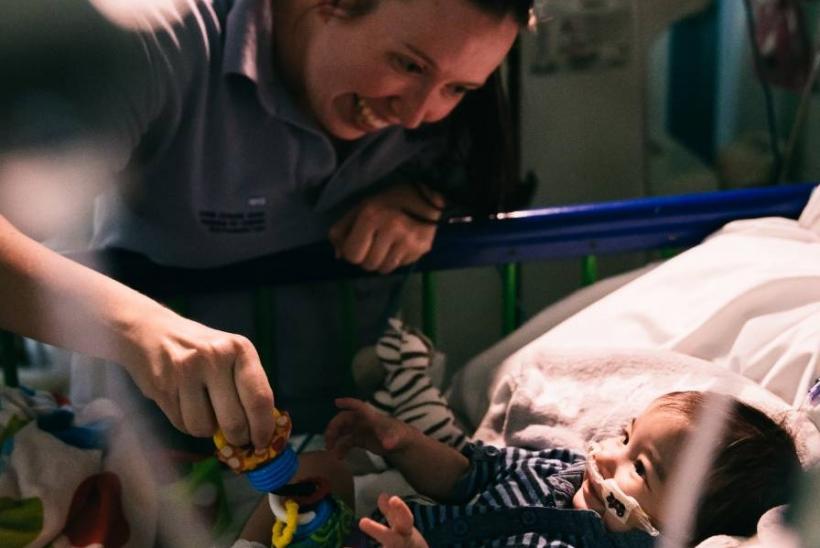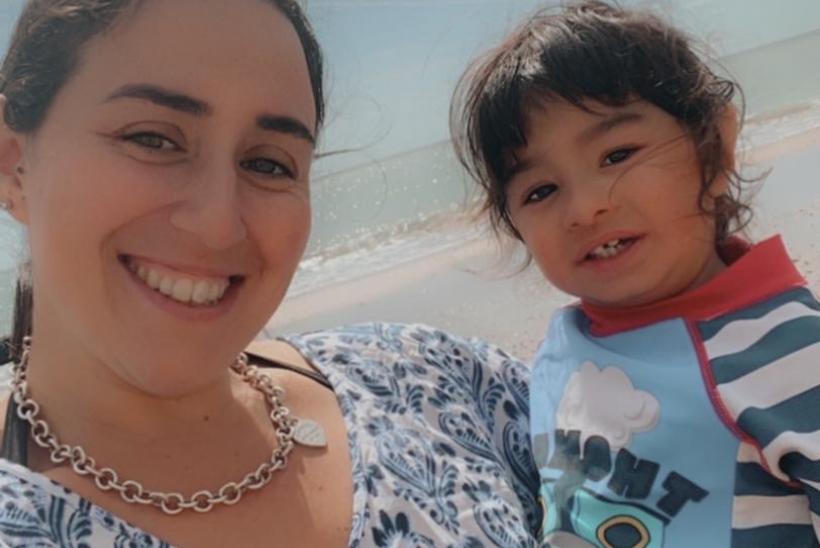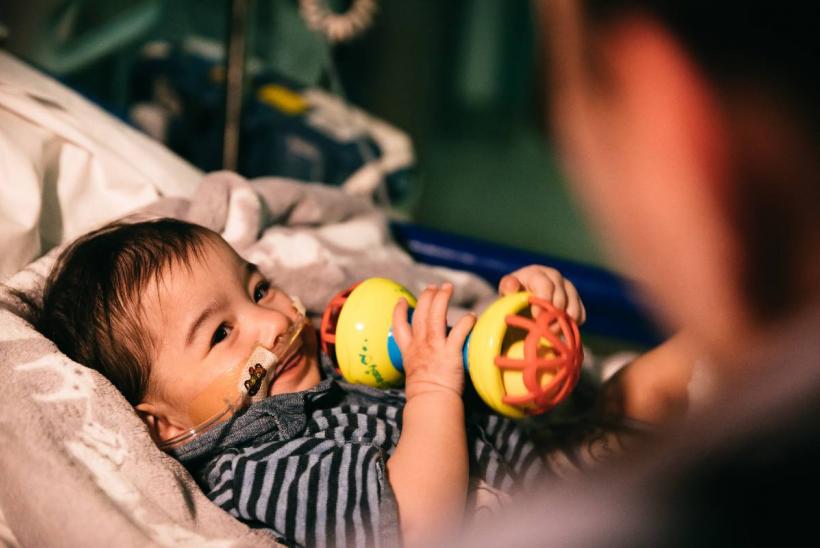Idris' First Year at GOSH
Born with congenital heart disease and chronic lung disease, Idris spent much of his first 12 months at Great Ormond Street Hospital (GOSH). Mum, Tahmina, shares her son’s story.
I had a normal pregnancy, and everything was going well until my 20-week growth scan showed Idris was quite small. Following another scan, I was referred to GOSH because there were concerns with Idris’ heart.
My first scan at GOSH picked up heart abnormalities. It was a shock, although we were hopeful. But I returned to GOSH four weeks later as Idris wasn’t growing. My final scan revealed his heart was three times the size it should be and was positioned incorrectly. There were holes, but the size of his heart was the main concern and how much room was left for his lungs to grow in his chest.
He was given a 50/50 survival rate from when he was born.
Heart surgery at GOSH
The first month was a blur, then, at nine weeks old, GOSH discussed heart surgery. Idris was extremely high risk as he also had pulmonary hypertension. It was thought he wouldn’t survive surgery, so he was put forward for palliative care. My first thought was I wanted my baby home no matter what, even if he was going to die. I decided I couldn’t live with giving up. This was his only chance.
The next day, Idris went for heart surgery and was in theatre for seven hours and had to be put on bypass. The next 48 hours after his surgery were critical. Seeing my three-month-old baby like that was incredibly tough.
Despite everything, he eventually pulled through and recovered well. But he then developed sepsis and stopped breathing; he had a lumbar puncture and was reventilated.
Rushed back to GOSH
In January 2019, Idris was rushed back to GOSH for bowel surgery because of a hernia in his groin blocking his bowel. We were due to come home when he deteriorated again. He was pulled forward for his second heart surgery and the operation went well. But then a CT scan showed his heart was pressing on his left bronchus. He was only breathing with one lung. The team were shocked he’d survived like that.
Idris’ condition was so unpredictable we were almost waiting for the next thing to go wrong. He was off oxygen and doing well for another four weeks, but he then started experiencing respiratory distress. We were then referred to the Royal London and he was put on non-invasive ventilation (CPAP).
Support from GOSH and GOSH staff
At the end of May 2019, we were able to go home, almost a year from his birth. Everything GOSH offers is phenomenal. The nurses were great, and the Play team used to come and look after Diyarri, his brother. Diyarri was only three years old and he would say to other siblings ‘is your baby not well either?’
Often the siblings are so young themselves, they’re just trying to make sense of everything. Play worker Kimberley was amazing with him and would bring him toys, taking him to play as much as possible so I could have a break. It wasn’t just Idris she kept occupied. At GOSH they’re so focused on family and siblings, it’s incredible.
A medical mystery and a miracle
Idris has been a medical mystery – nobody knows why he is the way he is. A consultant once said to me the best way to describe him is ‘a broken jigsaw we’re slowly trying to piece back together’.
I couldn’t fault GOSH. The care, the surgeries, the treatment – what he’s had has been phenomenal. Without GOSH, I wouldn’t have Idris. They saved his life and gave my family ours back too.
Idris today
Idris’ heart is repaired minus a tiny, inoperable hole, which doesn’t cause him any problems. He no longer requires oxygen and only uses CPAP, the non-invasive ventilation, overnight. This keeps his left bronchus open and helps it get stronger as he grows, given his heart was pressing on it for so long.
He has check-ups for his heart every nine months and is off all his heart medication. So long as everything is fine, he will then move to yearly check-ups. He’s defied everyone.
Idris and Diyarri are the best of friends. Diyarri is very good with him and understanding. And Idris loves music, nursery rhymes and being out. When we go to the forest, he loves picking up sticks. He’s very social and loves people and animals, especially dogs. His zest for life is incredible.
Play Helps Families
GOSH Play worker Kimberley talks about how play is crucial for patients and their siblings alike.
I work across the cardiac wards, Bear and Flamingo, at GOSH as a Play worker; I’ve been here for five years and I absolutely love it.
The Play team works with children of all ages. When we work with babies, as I did with Idris, the Play team supports their parents by demonstrating how to use stimulating and developmental activities to form bonds and attachments, and to help with their growth and development. We provide all different types of activities such as music, singing, creative play, sensory play, tummy time if the patient is able, story time, encouraging babies to reach, sit up, and providing them with appropriate toys to encourage them to walk when they’re ready for that stage.
Play is crucial to babies. There are a few members of the Play team, including myself, who are qualified in baby massage, and we teach parents how to massage their child, providing them with that positive touch, encouraging lots of eye contact and allowing bonding to grow between parents and babies. It’s especially important for parents with a child who’s in hospital, who may require lots of medical equipment.
I also worked with his brother Diyarri a great deal, because Idris was at GOSH for a long time. This meant keeping Diyarri busy with games and activities while his parents were talking about Idris’ treatment with doctors and nurses. As well as caring for Idris I built up a strong relationship with his brother and parents. It’s hugely important to provide siblings with opportunities to play as patients on our wards can be here for a long time, as Idris was.



